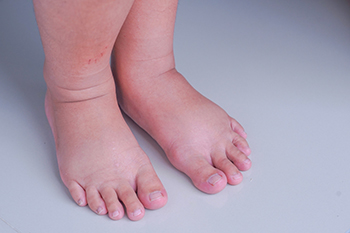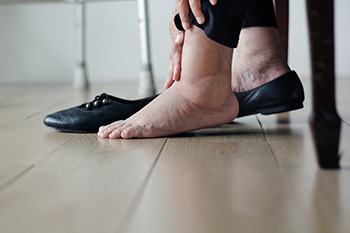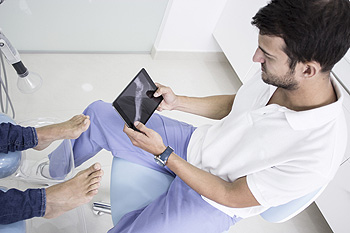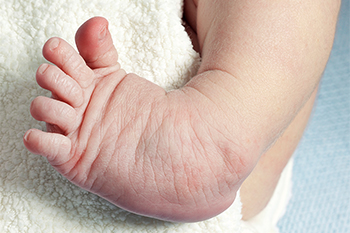Blog
Items filtered by date: January 2024
Causes of Puffy and Swollen Feet

Swollen feet, a common occurrence, can be attributed to various factors that impact the delicate balance of fluid regulation in the body. One primary cause is fluid retention, often linked to prolonged periods of standing or sitting, particularly in hot weather. The force of gravity hinders efficient circulation, leading to fluid pooling in the lower extremities. Additionally, dietary choices high in sodium can contribute to water retention, exacerbating swelling. Injuries or trauma, such as sprains or fractures, may trigger localized swelling as the body's natural response to inflammation. Conditions like venous insufficiency or deep vein thrombosis disrupt blood flow, promoting fluid accumulation. Pregnancy and hormonal fluctuations can also lead to swelling in the feet. If your feet are swollen, it is suggested that you consult a podiatrist who can determine what the cause is, and offer appropriate relief methods.
Swollen feet can be a sign of an underlying condition. If you have any concerns, contact Dr. Dean D. Hinners of Illinois. Our doctor can provide the care you need to keep you pain-free and on your feet.
Swollen feet are a common ailment among pregnant women and people who stand or sit for extended periods. Aging may increase the possibility of swollen feet and patients who are obese often notice when their feet are swelling too. There may be medical reasons why swollen feet occur:
- Phlebitis - A condition that causes the veins to become inflamed and can also cause leg pain.
- Liver disease - This may lead to low blood levels of albumin which is a protein. This can cause fluid in the blood to pass into the tissues and several areas of the body can become swollen.
- Heart failure - When the heart doesn’t pump properly the blood that is normally pumped back to the heart can pool in the veins of the legs causing swollen feet.
- Kidney disease - One of the main functions of the kidneys is releasing excess fluid in the body. This type of condition can make it difficult for the kidneys to function properly, and as a result the feet may become swollen.
- Deep-vein thrombosis (DVT)- This is a serious condition where blood clots form in the veins of the legs. They can block the return of blood from the legs to the heart which may cause the feet to swell. It is important to be treated by a podiatrist if this condition is present.
Swollen feet can also be caused by bone and tendon conditions, including fractures, arthritis, and tendinitis. Additionally, there may be skin and toenail conditions and an infection may cause the feet to swell. Patients who take medicine to treat high blood pressure may be prone to getting swollen feet.
Many patients elevate their feet to help relieve the swelling and this is generally a temporary remedy. When a podiatrist is consulted the reason behind the swelling can be uncovered and subsequently treated.
If you have any questions please feel free to contact one of our offices located in Metropolis and Eldorado, IL . We offer the newest diagnostic tools and technology to treat your foot and ankle needs.
How Aging Can Affect Your Feet

Aging gracefully is a journey that encompasses various changes throughout the body, and the feet are no exception. The intricate network of bones, muscles, and joints in the foot makes it particularly susceptible to the effects of aging. Certain conditions may arise, including plantar fasciitis, flat feet, and osteoarthritis. Plantar fasciitis involves inflammation of the ligament, called the plantar fascia, on the bottom of the foot. This condition often results from participating in high-impact exercises or wearing ill-fitting shoes. The telltale sign is sharp heel pain, especially pronounced in the morning. Flat feet, a consequence of aging and genetic predisposition, can lead to tired feet, painful arches, and swelling on the inner sides. This condition occurs when the supporting tendons and ligaments lose elasticity, a common side effect of aging, and causes the arches to weaken. Osteoarthritis, a prevalent concern for adults over 65, can affect the feet due to the intricate structure of bones and joints. While age increases the risk, repeated ankle sprains may also contribute to arthritis. If you are experiencing any of these foot problems, it is suggested that you schedule an appointment with a podiatrist.
Proper foot care is something many older adults forget to consider. If you have any concerns about your feet and ankles, contact Dr. Dean D. Hinners from Illinois. Our doctor can provide the care you need to keep you pain-free and on your feet.
The Elderly and Their Feet
As we age we start to notice many changes in our body, but the elder population may not notice them right away. Medical conditions may prevent the elderly to take notice of their foot health right away. Poor vision is a lead contributor to not taking action for the elderly.
Common Conditions
- Neuropathy – can reduce feeling in the feet and can hide many life-threatening medical conditions.
- Reduced flexibility – prevents the ability of proper toenail trimming, and foot cleaning. If left untreated, it may lead to further medical issues.
- Foot sores – amongst the older population can be serious before they are discovered. Some of the problematic conditions they may face are:
- Gouging toenails affecting nearby toe
- Shoes that don’t fit properly
- Pressure sores
- Loss of circulation in legs & feet
- Edema & swelling of feet and ankles
Susceptible Infections
Diabetes and poor circulation can cause general loss of sensitivity over the years, turning a simple cut into a serious issue.
If you have any questions please feel free to contact one of our offices located in Metropolis and Eldorado, IL . We offer the newest diagnostic and treatment technologies for all your foot and ankle needs.
Podiatrists Are Foot Care Experts

Podiatrists are specialized healthcare professionals who focus on the diagnosis, treatment, and prevention of disorders related to the feet and lower extremities. Podiatrists undergo extensive education and training, equipping them with the knowledge to address a spectrum of foot conditions, from common ailments to complex issues. Their responsibilities encompass conducting thorough examinations, utilizing diagnostic tools, and devising personalized treatment plans. Podiatrists commonly treat conditions such as bunions, heel pain, and toenail disorders. They may also provide guidance on proper foot care, footwear selection, and preventive measures. These professionals operate in diverse settings, including private practices, hospitals, and outpatient clinics. Some podiatrists specialize further in areas, such as sports medicine or surgery, offering comprehensive care for individuals of all ages. If you have foot or ankle problems, it is suggested that you make an appointment with a podiatrist.
If you are dealing with pain in your feet and ankles, you may want to seek help from a podiatrist. Feel free to contact Dr. Dean D. Hinners from Illinois. Our doctor can provide the care you need to keep you pain-free and on your feet.
What Is a Podiatrist?
A podiatrist is a doctor of podiatric medicine who diagnoses and treats conditions of the foot, ankle, and related structures of the leg. Your podiatrist may specialize in a certain field such as sports medicine, wound care, pediatrics, and diabetic care. Podiatrists have the ability to become board certified through training, clinical experience, and then taking an exam.
What Do Podiatrists Do?
On a daily basis, a podiatrist may perform the following activities:
- Diagnose foot ailments such as ulcers, tumors, fractures, etc.
- Use innovative methods to treat conditions
- Use corrective orthotics, casts, and strappings to correct deformities
- Correct walking patterns and balance
- Provide individual consultations to patients
It is very important that you take care of your feet. It’s easy to take having healthy feet for granted, however foot problems tend to be among the most common health conditions. Podiatrists can help diagnose and treat a variety of feet related conditions, so it is crucial that you visit one if you need assistance.
If you have any questions please feel free to contact one of our offices located in Metropolis and Eldorado, IL . We offer the newest diagnostic and treatment technologies for all your foot and ankle needs.
Heel Pain Can Be Treated!
Clubfoot Is a Congenital Foot Condition

Clubfoot, a congenital condition affecting newborns, is characterized by the abnormal positioning of the foot or feet. This condition is present at birth, with the infant's foot turning inward and downward, resembling the club's head. The primary causes of clubfoot are often linked to a combination of genetic and environmental factors. While the exact genetic mechanisms are not fully understood, there is evidence of familial predisposition. Environmental factors, such as intrauterine positioning or limited space in the womb, can also contribute to the development of clubfoot. This congenital anomaly affects the muscles, tendons, and bones in the foot, leading to a tightened Achilles tendon and an imbalance in the surrounding structures. Early detection and intervention are crucial for managing clubfoot effectively. Treatment options may include gentle stretching, casting, and, in some cases, surgical procedures to correct the foot's alignment and promote proper development. If your child has been born with clubfoot, it is strongly suggested that a podiatrist is on your healthcare team who can determine what the best treatment option is for this condition.
Congenital foot problems require immediate attention to avoid future complications. If you have any concerns, contact Dr. Dean D. Hinners of Illinois. Our doctor can provide the care you need to keep you pain-free and on your feet.
Congenital foot problems are deformities affecting the feet, toes, and/or ankles that children are born with. Some of these conditions have a genetic cause while others just happen. Some specific foot ailments that children may be born with include clubfeet, polydactyly/macrodactyly, and cleft foot. There are several other foot anomalies that can occur congenitally. What all of these conditions have in common is that a child may experience difficulty walking or performing everyday activities, as well as trouble finding footwear that fits their foot deformity. Some of these conditions are more serious than others. Consulting with a podiatrist as early as possible will help in properly diagnosing a child’s foot condition while getting the necessary treatment underway.
What are Causes of Congenital Foot Problem?
A congenital foot problem is one that happens to a child at birth. These conditions can be caused by a genetic predisposition, developmental or positional abnormalities during gestation, or with no known cause.
What are Symptoms of Congenital Foot Problems?
Symptoms vary by the congenital condition. Symptoms may consist of the following:
- Clubfoot, where tendons are shortened, bones are shaped differently, and the Achilles tendon is tight, causing the foot to point in and down. It is also possible for the soles of the feet to face each other.
- Polydactyly, which usually consists of a nubbin or small lump of tissue without a bone, a toe that is partially formed but has no joints, or an extra toe.
- Vertical talus, where the talus bone forms in the wrong position causing other bones in the foot to line up improperly, the front of the foot to point up, and the bottom of the foot to stiffen, with no arch, and to curve out.
- Tarsal coalition, when there is an abnormal connection of two or more bones in the foot leading to severe, rigid flatfoot.
- Cleft foot, where there are missing toes, a V-shaped cleft, and other anatomical differences.
- Macrodactyly, when the toes are abnormally large due to overgrowth of the underlying bone or soft tissue.
Treatment and Prevention
While there is nothing one can do to prevent congenital foot problems, raising awareness and receiving neonatal screenings are important. Early detection by taking your child to a podiatrist leads to the best outcome possible.
If you have any questions please feel free to contact one of our offices located in Metropolis and Eldorado, IL . We offer the newest diagnostic tools and technology to treat your foot and ankle needs.
The Significance of Precise Foot Measurement for High Heel Comfort

Ensuring an accurate foot measurement is a paramount step when delving into the world of high heels, as it profoundly impacts both comfort and foot health. Wearing ill-fitting shoes, particularly high heels, can lead to a myriad of issues, ranging from blisters and calluses to more severe problems like bunions and hammer toes. By taking the time to measure your feet accurately, you pave the way for a more comfortable and enjoyable high heel experience. An improper fit not only results in immediate discomfort but may also contribute to long-term foot ailments. Pinched toes and excessive pressure on the ball of the foot can be avoided with a precise measurement, enhancing overall foot stability. Whether shopping for the latest fashion trends or preparing for a special occasion, the importance of an accurate foot measurement cannot be overstated for those seeking both style and foot-friendly functionality in their high-heeled footwear. If have experienced foot problems related to wearing high heels, it is suggested that you visit a podiatrist.
High heels have a history of causing foot and ankle problems. If you have any concerns about your feet or ankles, contact Dr. Dean D. Hinners from Illinois. Our doctor can provide the care you need to keep you pain-free and on your feet.
Effects of High Heels on the Feet
High heels are popular shoes among women because of their many styles and societal appeal. Despite this, high heels can still cause many health problems if worn too frequently.
Which Parts of My Body Will Be Affected by High Heels?
- Ankle Joints
- Achilles Tendon – May shorten and stiffen with prolonged wear
- Balls of the Feet
- Knees – Heels cause the knees to bend constantly, creating stress on them
- Back – They decrease the spine’s ability to absorb shock, which may lead to back pain. The vertebrae of the lower back may compress.
What Kinds of Foot Problems Can Develop from Wearing High Heels?
- Corns
- Calluses
- Hammertoe
- Bunions
- Morton’s Neuroma
- Plantar Fasciitis
How Can I Still Wear High Heels and Maintain Foot Health?
If you want to wear high heeled shoes, make sure that you are not wearing them every day, as this will help prevent long term physical problems. Try wearing thicker heels as opposed to stilettos to distribute weight more evenly across the feet. Always make sure you are wearing the proper shoes for the right occasion, such as sneakers for exercising. If you walk to work, try carrying your heels with you and changing into them once you arrive at work. Adding inserts to your heels can help cushion your feet and absorb shock. Full foot inserts or metatarsal pads are available.
If you have any questions please feel free to contact one of our offices located in Metropolis and Eldorado, IL . We offer the newest diagnostic and treatment technologies for all your foot and ankle needs.

